Anwar al-Bunni devoted his life to human rights in Syria. Now in exile in Germany, he is part of a landmark first prosecution for war crimes against Bashar al-Assad’s regime
December 13, 2020
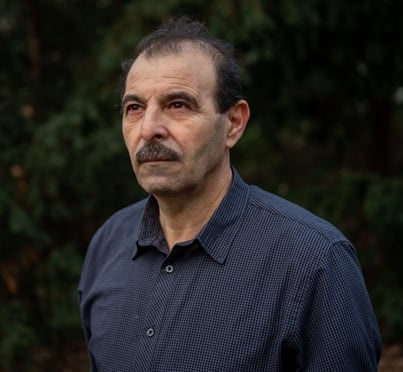
Source: The Guardian | Emma Graham-Harrison
Anwar al-Bunni had only been in Germany a couple of months when he walked into a shop and found himself face to face with the man he believes had interrogated and jailed him nearly a decade earlier. Both men were buying groceries in a Turkish shop near the gates of Marienfelde, the Berlin refugee camp they now called home. There was a vague flicker of recognition, but Bunni couldn’t quite place the other man.
It was 2014, a year before Angela Merkel’s decision to open Germany’s borders to refugees drew more than a million people fleeing war and hardship to the country. Even so, thousands of Syrians had already found their way to Berlin. Bunni, a human rights lawyer with more than three decades’ experience fighting the Syrian regime in the courts, and several years spent inside its jails for his trouble, was part of a large network of colleagues, clients, friends and former opponents.
“I was with my wife, and I said to her, ‘I know this man’ but I couldn’t remember who he was,” he recalls. “Then, after a few days, one of my friends said, ‘Did you know Anwar Raslan is in Marienfelde with you?’ And then I realised.”
The two Anwars, born four years apart, had both studied law, but chose to use it on opposite sides of Syria’s authoritarian political system. Raslan became a police officer, before transferring to the intelligence services, where he would help detain Bunni.
At the time, Bunni thought little more of the meeting, settling back to his legal files, pursuing at a distance the same struggle against the Syrian state and its abusers that had consumed him for decades. “I don’t hate him as a person,” Bunni says of Raslan. “I know the problem is the system. So I didn’t feel anything, in fact.”
Yet within four years, the two men’s paths would cross again, their former positions reversed, as Germany prepared a landmark court case. This time Bunni was working with the authorities, assisting German prosecutors, while the other Anwar faced prison.
Nearly a decade into Syria’s civil war, Raslan has become the first person to face trial – anywhere in the world – over the state-sponsored torture and murder of civilians during the conflict. Bunni, once a thorn in the side of Damascus officials, helped find witnesses willing to testify.
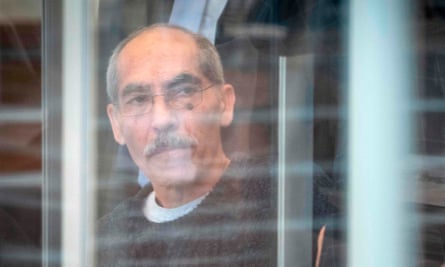
Anwar Raslan arriving at court to face trial in Germany. Photograph: AFP/Getty Images
Raslan, a former colonel in the intelligence services, has been charged with crimes against humanity, committed in the early years of the conflict, before he defected in 2012. In that time, he worked for military intelligence, allegedly leading an investigative unit under the notorious Branch 251, which had its own prison. There, prosecutors claim, Raslan oversaw a reign of terror, with prisoners subjected to torture including electric shocks, beatings and sexual assault over a period of 16 months. His charge sheet alleges that more than 4,000 people were tortured there during that time, and that 58 detainees died.
Raslan’s trial began on 23 April in Koblenz, a historic city on the banks of the Rhine between Frankfurt and Cologne, before a panel of three judges. It is expected to last well over a year. Alongside him was Eyad al-Gharib, who is alleged to have served in a low-level role under Raslan in Damascus. It was a landmark moment for countless Syrians who had survived government torture chambers or lost loved ones to them. If found guilty, Raslan faces life in jail.
***
Syria’s war has now raged for nearly a decade, and in the course of its struggle to stay in power the government of Bashar al-Assad has repeatedly broken international law, using torture and chemical weapons attacks, targeting hospitals and other civilian infrastructure. For all the horrors committed by Isis and other parties to the conflict, pro-government forces are still responsible for the majority of civilian casualties and disappearances inside Syria.
There is little hope of justice either at home or in international tribunals. With the opposition now largely defeated inside Syria, Assad and his lieutenants are unlikely to be tried in domestic courts. And because Syria is not a party to the international criminal court, its government cannot be pursued by ICC prosecutors. The UN security council could request an investigation, but attempts to do so have been repeatedly blocked by Russia and China. Calls to set up a special tribunal, like the one that tried war crimes in the former Yugoslavia, have also foundered.
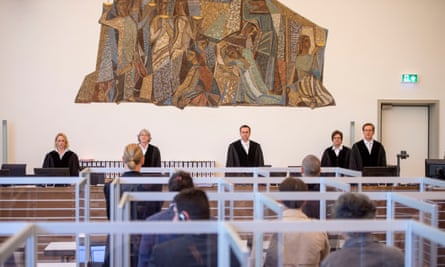
The first trial of members of Syrian security services for crimes against humanity taking place in Germany.Photograph: Reuters
This leaves national courts as the only possible route for survivors to try to hold regime figures to account. Countries such as Germany include the doctrine of universal jurisdiction in their laws, allowing courts to prosecute someone for a crime committed anywhere in the world, if it is serious enough.
This trial is not the first attempt to bring Syria’s ruling class to court: a number of arrest warrants have been issued against senior figures by western governments. But the regime’s elite and serving officers are safely ensconced within Syria’s borders, travelling only to allied states that would never give them up. So this trial marks the first time someone accused of a key role in the state’s archipelago of jails has had to face questions under oath – about how the torture chambers operated, and how they helped prop up the regime of Bashar al-Assad.
***
Bunni is a wiry man, with a bushy moustache, who favours slightly rumpled suits with an open-necked shirt. He has spent most of his adult life in a dangerous and largely fruitless struggle for human rights in a country that has become a byword for their abuse. Somehow, that has not diminished his energy or dulled his sense of humour. He is rarely without a smile on his face, and a cigarette or vape pen in one hand, the latter more a consequence of Germany’s ban on indoor smoking than an attempt to kick a habit.
At 61, his hair is receding but still a youthful dark brown, flecked with silver. His outlook, too, is laced with the conviction of youth. “I never, never lost my belief,” he says, when I ask if he ever despaired of his fight for a better Syria. “I am sure we will win.”
We met earlier this year, before the trial, in a Berlin creative quarter dominated by converted warehouses and hipster cafes, at the headquarters of a film production company. It seemed such an unlikely meeting place that I wondered if I’d muddled the address. In fact, a Berlin film-maker had offered Bunni a discounted rate on a room off a corridor dotted with stylish old posters, well-tended plants and the open-door offices of producers.
He is aware how unlikely his optimism and humour can seem, against the backdrop of the profound tragedy that has engulfed Syria. “I hope you don’t think I am Don Quixote,” he says at one point. The Syrian death toll is estimated at more than half a million people, with tens of thousands more missing. More than half the country’s prewar population have fled their homes, 6.6 million becoming refugees abroad, with nearly as many displaced inside Syria.
Human rights abuses also long predate the war. If Bunni’s long struggle for a more democratic Syria failed to curb the government’s conduct, it was more than enough to get him detained multiple times, including a five-year jail sentence. He knows the cost of losing loved ones into the prison networks. His sister, three brothers, one sister-in-law and one brother-in-law have between them spent 73 years as political prisoners in Syria’s jails.
And while Bunni’s work in prewar Syria was high profile, the family often struggled financially because he took cases pro bono. The authorities persecuted his wife, who lost her job as an engineering assistant in 2007 and was prevented from travelling.
“She saw that my friends had good houses, expensive cars, even though she knew I was a better lawyer,” he says with a rueful smile. “She suffered a lot because of me.”
When I ask if she has ever asked him to change his profession, his face creases with laughter. “It’s complicated,” he says, before admitting that she has tried to ban their two children from following in his footsteps, and once asked him to end a hunger strike in jail because their children were so worried that they could not study.
When Bunni finally fled his homeland in 2014, the authorities must have hoped he would fade into insignificance; there was no obvious path to continue his work in a Europe tired of Syria’s war and focused on fighting Isis. Instead, his influence has grown.
***
Bunni’s life story can seem more fable than fact, full of unlikely twists and improbable coincidences, long before his Berlin meeting with Raslan. His father, a goldsmith whose specialities included making reproduction antiques for unscrupulous dealers, died when he was 12, and Bunni took over his trade to support the family while his siblings finished school.
He left the craft behind long ago, but not his skills or his eye for beauty. A friend shows me a picture of a pendant Bunni made in jail. A dolphin’s sinuous body had been moulded from powdered coffee, powdered milk and date stone fragments mixed with glue and left to harden, then polished to a fine shine so that it looked as if it had been carved from a rare composite. An outline was traced in copper stripped from old wires.
Bunni decided to become a lawyer after watching his siblings disappear into jail for their communist politics. But with the family still short of money, he worked in construction in the early 1980s before he could start legal training, and in those years helped build Syria’s most notorious prison, Saydnaya, near Damascus. A photo shows a young man in aviator sunglasses at the site, grinning in an implausibly pristine white shirt, with the extravagantly wide collars of the era.
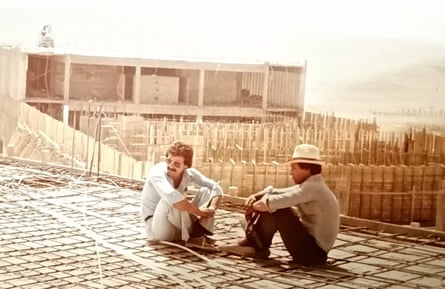
Anwar al-Bunni, on left, in 1982, at Saydnaya, the prison he helped build while working in construction before he began legal training. Photograph: courtesy of Anwar al-Bunni
“I was happy when I saw the plans,” Bunni says now of a project that was originally designed to be a more humane jail, and which he knew was likely to house one of his imprisoned brothers. “There was nothing underground – all the rooms had sun and air, there was a place to do sports, football, basketball.” But by the time of a detainee riot in 2008, Saydnaya had already become a byword for abuse and torture.
Bunni didn’t share his brothers’ politics; he has never been a believer in party or religion, only in the human spirit and individual rights. “I never believed that God wanted to help me, maybe because I had only myself to depend on from the age of 12,” he says. The activities that helped land him in jail in 2006 – including drafting with other activists a proposed new, democratic constitution for Syria – were meant as a challenge not only to Assad, but to his opponents, he adds. “Everyone promises democracy and human rights, but often they have no practical plan to apply this. I wanted to know: what is your programme to make people’s lives better?”
***
When Bunni began his legal apprenticeship in the mid-80s, Hafez al-Assad ran the country and was grooming his eldest son, Bassel, to succeed him. Bashar was just a medical student with few political aspirations; but his brother’s death in a car crash in 1994 made the gangly, British-educated ophthalmologist heir apparent overnight. Just six years later, Assad senior died, too, leaving the 34-year-old in charge of the country (technically, he won a referendum to take power with 97% of votes).
There was a brief moment of hope that his youth, time spent abroad and even a glamorous British-Syrian wife, Asma, meant Bashar would rule as a reformer, although that soon passed. The civil war later proved that the son could far surpass his father when it came to bloodshed and brutality.
“There was lots of lying when Bashar took power,” Bunni says of the time known as the Damascus spring. “It was all very superficial – his western habits, and saying he will open the door for democracy and civil society. We didn’t believe it, but we wanted to try. Then they started arresting people.”
Together with other idealistic young lawyers, Bunni decided to start holding the government to account. “We set up a committee for the defence of political detainees.” That work led indirectly to the Syrian Centre for Legal Studies and Research, an ambitious human rights organisation formed in Damascus in 2004.
The centre’s bland name was meant to allay official concerns, Bunni says, although its work contributed to his jail sentence.In 2006, he was sentenced to five years for “spreading false news”, starting an unlicensed political group and dealing with foreign countries.
When Bunni was released in 2011, the country seemed on the brink of further change. In the wake of the Arab spring, it looked as if Assad might join other toppled dictators and be exiled like Tunisia’s president Zine al-Abidine Ben Ali, jailed like Egypt’s Hosni Mubarak, or even lynched like Muammar Gaddafi. But Syria’s revolution spiralled into full-blown war, as an ever-proliferating number of militant groups, among them Islamist extremists, vied for power.
Syria became a more risky place. Many veterans of the human rights struggle were killed or disappeared, among them two of Bunni’s closest friends, Khalil Ma’touq and Razan Zaitouneh, who had set up the legal studies centre with him. Ma’touq vanished in a government-controlled area in 2012; Zaitouneh is thought to have been kidnapped by Islamist group Jaysh al-Islam a year later, on the outskirts of Damascus.
Even as the threats grew, Bunni wanted to stay; his friends had given their lives, and he knew exile often brought a slow slide into irrelevance. But in early 2014, contacts warned him that a new warrant was out for his arrest, and security forces swooped on his brother Akram at a wedding, mistaking him for Anwar. Bunni sent his wife and children abroad first, spread the news that he had fled, too, and went into hiding to plan his own escape.
He dyed his hair blond – including his distinctive moustache: shaving it off would have left a telltale tan mark – and wore blue contact lenses. One friend lent him their ID; another drove him to the border with Lebanon and told him to wait for a call. They set off at dusk. “We needed it to be at a time when eyes find it harder to see, but people haven’t yet turned on the lights, not so dark that they are using torches at the checkpoints. That’s the perfect time to cross.”
They passed six or seven checkpoints, his friend flirting with guards to draw attention away from her silent passenger with his fake papers. Barely an hour later, they reached an unguarded stretch of mountain, where Bunni walked over the border into Lebanon and a new life.
***
Bunni’s contacts meant the family did not share the long journey by land and sea of many Syrians who fled to Germany. Visas issued in Beirut allowed them to fly directly to Berlin, where they claimed asylum, and where Bunni resumed his fight for human rights.
In March 2015, two days after moving from the refugee camp into his first German home, Bunni flew to New York to address the United Nations. Invited by Amnesty International, he spoke on a panel about arbitrary detention and enforced disappearance in Syria. During the course of that brief meeting, he told the UN, another two detainees would have died in a Syrian jail; he also quoted estimates that 150,000 Syrians were “missing”.
But back in Germany, Bunni had no office, no licence to practise and, despite the UN invitation, European leaders showed little interest in the Syrian war. “I didn’t imagine they would see all these things happen and stay silent,” Bunni says. “I didn’t want to believe that Europe would spend all this time standing by and watching. This really shocked me.”
Anwar Raslan had perhaps calculated that this lack of interest, or his decision to defect in 2012, would protect him. He had left Syria a few months after a massacre in the opposition stronghold of Houla, his family home, heading first to Jordan and then to Turkey. There, he joined the opposition and later sought asylum in Germany.
He was open about having worked for the regime’s intelligence services, assuming his past was behind him. He even sought help from the German police in 2015, when he became convinced that Syrian regime agents were following him. The police found no evidence of this, but in 2017 Raslan was called as a witness in an investigation into Syrian war crimes. That interview prompted investigators to start looking into Raslan’s own activities, and in 2019 he was arrested and charged with crimes against humanity.
In court this May, Raslan rejected all charges. In a statement read out by his lawyer, he said he had treated detainees by the book and “even offered them coffee when they first came to be interrogated”. Some had since met up with him in exile, he added. The rapid rate with which he had released prisoners had led to a reduction in his powers, he said, according to transcripts of the trial published online by the Syria Justice and Accountability Centre.
In June, Bunni stepped into the witness stand to detail both the horrors and the bureaucratic structures of Assad’s jails and torture chambers, which he knows intimately from his own experience and after years representing survivors. “It’s not a personal issue,” he says of the court case. “My target is justice for all Syrians.”
When he first arrived in Europe, Bunni was disillusioned by the west’s ability to ignore the Syrian government’s abuses. But in exile, he met up with lawyers, activists and campaigners he knew from his years of struggle, and discovered that several were attempting to use Europe’s legal systems to mount a grassroots fight.
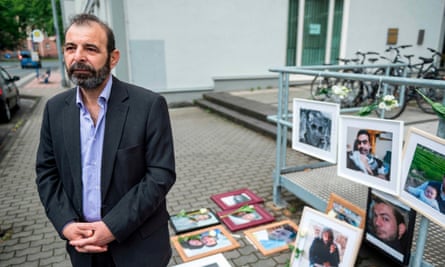
Bunni, with photographs of victims of the Syrian regime, outside the trial in June. Photograph: AFP/Getty Images
While Bunni cannot practise as a lawyer, he has something perhaps more useful than a credential: trust among the Syrian community that allows him to help find witnesses to testify about abuses in their homeland. Identifying survivors, and being able to talk through any concerns they may have about testifying, is key to any attempt to prosecute war crimes committed far away, when there is unlikely to be physical evidence. He is now part of a network of Syrian survivors and European legal activists determined to help drag cases towards justice, who have submitted files to authorities in Sweden, Norway and Austria, as well as Germany. At a time when the news from Syria is bleak, their progress is a rare spot of light.
They do not have any illusions that the case against Raslan will have immediate implications for the Syrian regime. Even if he is found guilty, he did not design or run the system, and left early in the war; meanwhile, the torture machine grinds on. But a criminal case puts a crack in the wall of impunity that Russian support and western indifference have allowed Assad to erect around his inner circle.
“If this means that one less person sleeps easy at night in Damascus, it is a step in the right direction,” says Patrick Kroker, a lawyer focused on international crimes and accountability at the European Center for Constitutional and Human Rights, which has played a key role in the continent-wide effort to use universal jurisdiction to pursue justice for Syrians. Historically, war crimes tribunals – most notably the Nuremberg trials of senior Nazis – have been held after the fighting has stopped, and usually convened by victors. Unusually, this case opens as the war still rages, and the man in the dock worked for the winning side; it could set new precedents, not only for Syria but for other countries, too.
“This trial will affect the individuals still committing crimes in Syria,” Bunni says. “It is happening while the events are still going on, not after the conflict finishes and everyone relaxes, and says, ‘Let’s have some justice.’”
He also points to the integrity of the German legal system as one that can provide an incontestable record of crimes in Syria. “It’s important to make clear for all the world what really happened in Syria. No one can say this is a fake court.”
***
Six years into his life in Berlin, Bunni is so convinced he will one day go back to Syria that he hasn’t even tried to learn much German. He is grateful for the safe haven, but misses home and its routines. One of his favourite haunts was the lawyers’ cafe in the Palace of Justice courthouse, a colonial-era building in the centre of Damascus, which served coffee, tea and cigarettes, as well as a constant diet of legal gossip as counsel gathered before and after their cases, or met clients.
In Berlin, Bunni drinks mostly instant coffee – several cups a day – but offers guests fiercely strong Syrian coffee, fragrant with cardamom, and Syrian sweets. The rush into exile means that date cakes can now be bought across Berlin.
His two phones buzz with messages from Syrians across Europe who want to seek help or offer it, and from activists. On the day we meet, his WhatsApp shows more than 4,800 unread messages. He is worried about Syrian asylum seekers who have been detained in Cyprus, and several hundred at risk of deportation from Saudi Arabia.
Bunni is much safer than he ever was in Damascus, but there is a constant barrage of threats on social media – mostly anonymous, but a reminder that many in Syria would be happy to see his name added to the long lists of dead and disappeared. And he worries about colleagues still in Syria.
While the Raslan case continues, Bunni is chasing other leads. As we speak, one torture survivor who bears permanent physical scars arrives to discuss a case. New names of possible suspects are always trickling in. “We just heard about him three days ago,” Bunni says of a Syrian now in Europe and suspected of war crimes.
He is convinced that Assad’s lieutenants cannot hold on to power for ever. For now, he hopes that public relations campaigns, sanctions and the threat of arrest and trial may limit their role in any international negotiations over the country’s postwar future, or lucrative reconstruction efforts. “My main goal is to keep them excluded, and cut off all the roads to rebuilding their reputation,” he says. “If they are part of our future, it will be a disaster.”
He also hopes that the cases he is helping piece together across Europe will resonate far beyond Syria – a warning that, even with powerful international allies, there is no such thing as impunity from justice.
“Maybe we can save people in other places, where there are dictators like Assad who think they can do this and survive,” he says. “Because the criminals now are afraid. They know they are not untouchable.”
